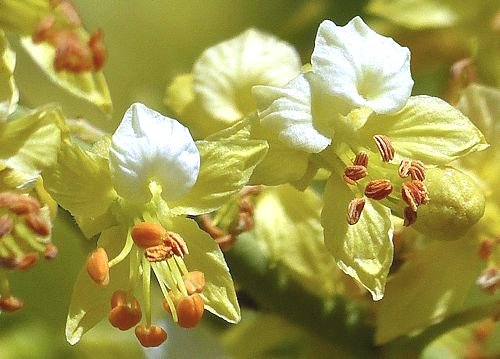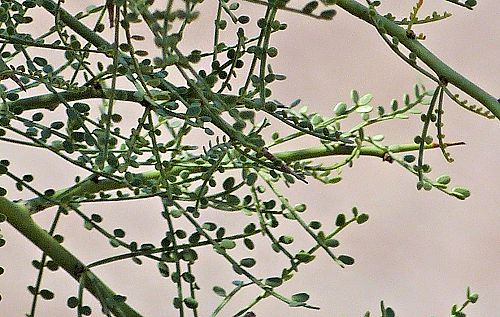Growing Parkinsonia microphylla:
Yellow Palo Verde
Back to Trees and Palms
Description
Form: Tree.
Lifespan: More than 100 years.
Leaf retention: Drought and cold deciduous.
Growth rate: Slow.
Mature Size: 10-20' (3-6m) high and wide.
Flowers: Five petals, the top one white, the other four pale yellow, edible.
Bloom: Spring.
Fruit: A bean pod tightly constricted around its edible beans.
Leaves: Tiny, green, oval leaflets, missing if the tree has been exposed to drought. This tree provides light filtered shade.
Stems: Yellow-green, photosynthesizing, with pointed and spine-like branch tips. Branches may be shed during a prolonged drought.
Roots: Deep, nitrogen-fixing*.
Wildlife: The flowers attract bees, other pollinating insects, and hummingbirds. The pods and seeds attract birds and mammals.
Toxic / Danger: Spines at the end of branches.
Origin: Arizona, California, and Mexico.
Form: Tree.
Lifespan: More than 100 years.
Leaf retention: Drought and cold deciduous.
Growth rate: Slow.
Mature Size: 10-20' (3-6m) high and wide.
Flowers: Five petals, the top one white, the other four pale yellow, edible.
Bloom: Spring.
Fruit: A bean pod tightly constricted around its edible beans.
Leaves: Tiny, green, oval leaflets, missing if the tree has been exposed to drought. This tree provides light filtered shade.
Stems: Yellow-green, photosynthesizing, with pointed and spine-like branch tips. Branches may be shed during a prolonged drought.
Roots: Deep, nitrogen-fixing*.
Wildlife: The flowers attract bees, other pollinating insects, and hummingbirds. The pods and seeds attract birds and mammals.
Toxic / Danger: Spines at the end of branches.
Origin: Arizona, California, and Mexico.
Cultivation and Uses
USDA hardiness zones: 8b-10.
Heat tolerant: Yes.
Drought tolerant: Yes.
Sun: Full sun.
Soil: Well draining, dry, low in organic content, pH 5.6-8.5 (acidic to alkaline). *Do not use a nitrogen fertilizer.
Water after becoming established: Deep water monthly during drought.
Prune: Pruning this tree should be avoided when possible. To raise the canopy, start when the tree is young and in warm weather only, remove the lowest branches. Beware of sharp pointed branch tips. Disinfect cutting tools before pruning, by wiping with 70-100% isopropyl alcohol before and between each plant, to avoid spreading plant diseases.
Litter: Seed pods, and in prolonged drought, branches.
Propagation: Seed, scarified and soaked.
Pests: Larvae of the palo verde root borer (Derobrachus geminatus) feed on this tree. They grow up to 4" (10cm) in length. No chemical treatment is effective; a healthy tree is the best defense. Mistletoe should be removed quickly.
Uses: Ornamental, culinary. The seeds can be ground for flour, the green pods can be boiled with meat, the sweet green seeds and flowers can be eaten raw.
USDA hardiness zones: 8b-10.
Heat tolerant: Yes.
Drought tolerant: Yes.
Sun: Full sun.
Soil: Well draining, dry, low in organic content, pH 5.6-8.5 (acidic to alkaline). *Do not use a nitrogen fertilizer.
Water after becoming established: Deep water monthly during drought.
Prune: Pruning this tree should be avoided when possible. To raise the canopy, start when the tree is young and in warm weather only, remove the lowest branches. Beware of sharp pointed branch tips. Disinfect cutting tools before pruning, by wiping with 70-100% isopropyl alcohol before and between each plant, to avoid spreading plant diseases.
Litter: Seed pods, and in prolonged drought, branches.
Propagation: Seed, scarified and soaked.
Pests: Larvae of the palo verde root borer (Derobrachus geminatus) feed on this tree. They grow up to 4" (10cm) in length. No chemical treatment is effective; a healthy tree is the best defense. Mistletoe should be removed quickly.
Uses: Ornamental, culinary. The seeds can be ground for flour, the green pods can be boiled with meat, the sweet green seeds and flowers can be eaten raw.
Comments
This plant is a member of the Legume family (Fabaceae). The scientific synonym of this plant is Cercidium microphyllum. Other common names are Foothills Palo Verde and Littleleaf Palo Verde. In contrast to other palo verde species, this tree is pale yellow instead of vivid yellow in full bloom, smaller, more drought tolerant, more likely to be leafless, and has a slower growth rate. It does better below 4000' (1220m) elevation.
Do you have additional information or a different experience for these plants that you would like to share? Email info@GardenOracle.com. All contributions are welcome and appreciated.
This plant is a member of the Legume family (Fabaceae). The scientific synonym of this plant is Cercidium microphyllum. Other common names are Foothills Palo Verde and Littleleaf Palo Verde. In contrast to other palo verde species, this tree is pale yellow instead of vivid yellow in full bloom, smaller, more drought tolerant, more likely to be leafless, and has a slower growth rate. It does better below 4000' (1220m) elevation.
Do you have additional information or a different experience for these plants that you would like to share? Email info@GardenOracle.com. All contributions are welcome and appreciated.





Latest update: September, 2024
© 2008-2026 by GardenOracle.com

